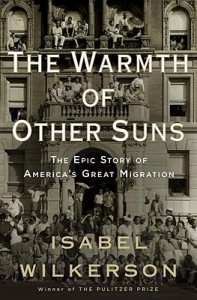…a review of Isabel Wilkerson’s The Warmth of Other Suns: the Epic Story of America’s Great Migration
Growing up a Midwesterner, in and around medium-sized cities (Saginaw and Lansing, Michigan), I can always remember having black students as classmates and friends. I recollect a time, while being lectured in second grade history class, that my teacher said most black people in America are somehow descendants of slaves. This really perked my interest, and with my uncouth and inquisitive nature at the time, I raised my hand and asked, referring to a black classmate, “Does that mean that ______’s ancestors were slaves?” Looking back, I remember looking at that student and seeing a somewhat embarrassed expression on their face. This, in turn, made me even more embarrassed for asking the question. This was my friend! I was just beginning to learn of the story of blacks in America: their history, failures, and successes.
My mother and father trained me well, thankfully. I never heard a slight or a joke about any other race. We were taught that there was no difference in the color of one’s skin. After all, God created all humans in His image. Any other race was no less in God’s image.
In high school and college, I worked in ministries which took me into neighborhoods that were predominately African-American. From the south-side of Lansing to nearly all of Gary, Indiana, black families were a part of my prayer life and ministry to God. I’m not sure what exactly sparked my mind to be interested in the demographics and history of cities like Gary and Chicago, but I began to research here and there just why many cities had gone from dazzling to dilapidated in the course of just a generation. When I heard of Isabel Wilkerson’s new work, The Warmth of Other Suns, I knew that I would enjoy delving into it, but hesitated at first because of one reason: usually books on African-American history are slanted to a liberal world-view. Even a just a balanced account, I thought, would suffice. Eventually, I surrendered my preconceptions, and bought it for my Kindle.
 The Warmth of Other Suns is a detailed historical narrative of the immense migrations of blacks from the rural and agricultural south to the urban and industrial north from 1915-1975. Isabel Wilkerson focuses on three individuals, from three different states, and from three different waves of the migration. Ida Mae Gladney and her sharecropping husband fled Mississippi to settle in Chicago in the 1930’s. George Starling and his wife fled threats of lynchings in central Florida for New York City in the 1940’s. And Robert Foster left the underwhelming prospects of being a colored doctor in a highly segregated Louisiana town to the promising prospects of Los Angeles. Throughout the narrative, the larger history of the Great Migration is filled in, providing a depth that does not leave the reader in the dark concerning the whole of that time period.
The Warmth of Other Suns is a detailed historical narrative of the immense migrations of blacks from the rural and agricultural south to the urban and industrial north from 1915-1975. Isabel Wilkerson focuses on three individuals, from three different states, and from three different waves of the migration. Ida Mae Gladney and her sharecropping husband fled Mississippi to settle in Chicago in the 1930’s. George Starling and his wife fled threats of lynchings in central Florida for New York City in the 1940’s. And Robert Foster left the underwhelming prospects of being a colored doctor in a highly segregated Louisiana town to the promising prospects of Los Angeles. Throughout the narrative, the larger history of the Great Migration is filled in, providing a depth that does not leave the reader in the dark concerning the whole of that time period.
The author tells each individual’s story vividly, without bogging the narrative down with useless detail. The environment of the Jim Crow Laws is vividly portrayed. The culture of southern blacks is captured perfectly: from their food to their southern-black vernacular –though at first the dialog takes some getting used to, due to frequent unfamiliar contractions and expressions! The reader also feels a real acquaintance to each protagonist, wanting them to succeed, while also being able to see flaws and mistakes each made.
For the most part, the author does a good job of generalizing unwelcome details, but in an instance or two, she describes things a little too much for the Christian mind, including some profanity. As a whole however, the book is very modest. As for the overall political slant of the book, I would say that it is legitimately balanced: this coming from a very conservative perspective. The author is truly artful in her journalism–presenting all the points of view, and allowing the reader to make his or her own judgments. I can say, from my point of view, that The Warmth of Other Suns is balanced and unbiased.
For any lover of twentieth century history, The Warmth of Other Suns is a treasure. For me, it gave new insight into the the black culture, the spite expressed on both sides, and the satisfaction that the migrants gained from being able to provide a good upbringing for their children, whether they accepted it or not.

I just finished ‘The Help’–which follows the story of 3 African American maids in the South during the 1960’s and how they were treated by their employers–now I want to read The Warmth of Other Suns to fill in some blanks of life before this time–I think you would like The Help–it can be a bit graphic in some areas–